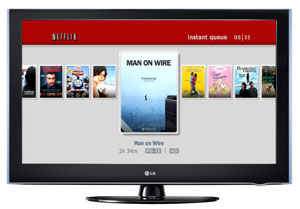The Internet belongs to Netflix


Netflix!? Yes, Netflix. To be exact, according to Sandvine, "20.6% of all peak period bytes downloaded on fixed access networks in North America are Netflix." That's one in five bytes devoted to streaming Star Trek or The Girl with the Dragon Tattoo. Who knew?
You may think of Netflix as that mail-order DVD business, but the company's growth as an Internet video-on-demand (VoD) service has been explosive. Now, if only the Internet can keep up with the demand.
I've said before that technically the biggest problem that Netflix, Hulu, and the other Internet video streaming sites is not enough Internet bandwidth to go around. I was right in thinking that the last mile is a real problem for Internet VoD. What I hadn't realized though that even before Roku, the new Apple TV, and Google TV have had a chance to really take off in the mass market that the demand for VoD was already so high. At this rate of growth, the Internet backbones will soon be creaking from overload as well.
In Canada, for example, where Netflix recently launched an online VoD service, Sandvine reports that at its peak, around 9:30 PM local time, Netflix takes up more than 95% of all bandwidth in use. Sandvine calls this "shocking levels of success," I can only agree.
This trend is only going to continue. Cable TV subscribers are dropping their TV packages for Internet video services like Hulu and Netflix. Why shouldn't they? With the exception of sports and local TV shows, you can get most of the same shows and movies you want from Internet TV for a tenth of the price of cable. And, I might add, this is before Hulu Plus, the Hulu subscription service that offers a much wider variety of TV shows, drops its monthly price to $4.95.
Besides creating a technical problem, there are business problems here as well. As Sandvine stated, "For service providers, this is a double-whammy: not only are they losing revenue to these over-the-top offerings, but they are losing network capacity delivering these services." So, even as customers want more bandwidth than ever, the cable ISPs have less of a financial reason to deliver it to them. This doesn't bode well for users.
At the same time, the content providers aren't happy about the way content is escaping from their traditional channels of over-the-air TV transmission, cable TV, and DVDs. Indeed, for at least a while the old big three TV networks, ABC, CBS, and NBC, were blocking their content from Google TV users. CBS and NBC seem to have backed off from their content blockade, but the issue of who pays for the content and how on the Internet remains.
Clearly both content providers and ISPs are still coming to terms with what they see as Internet VoD's shocking success. I'm not sure why they didn't see this coming, I did. Perhaps they believed, as Steve Jobs did once, that Internet TV was just a hobby. It's not anymore.